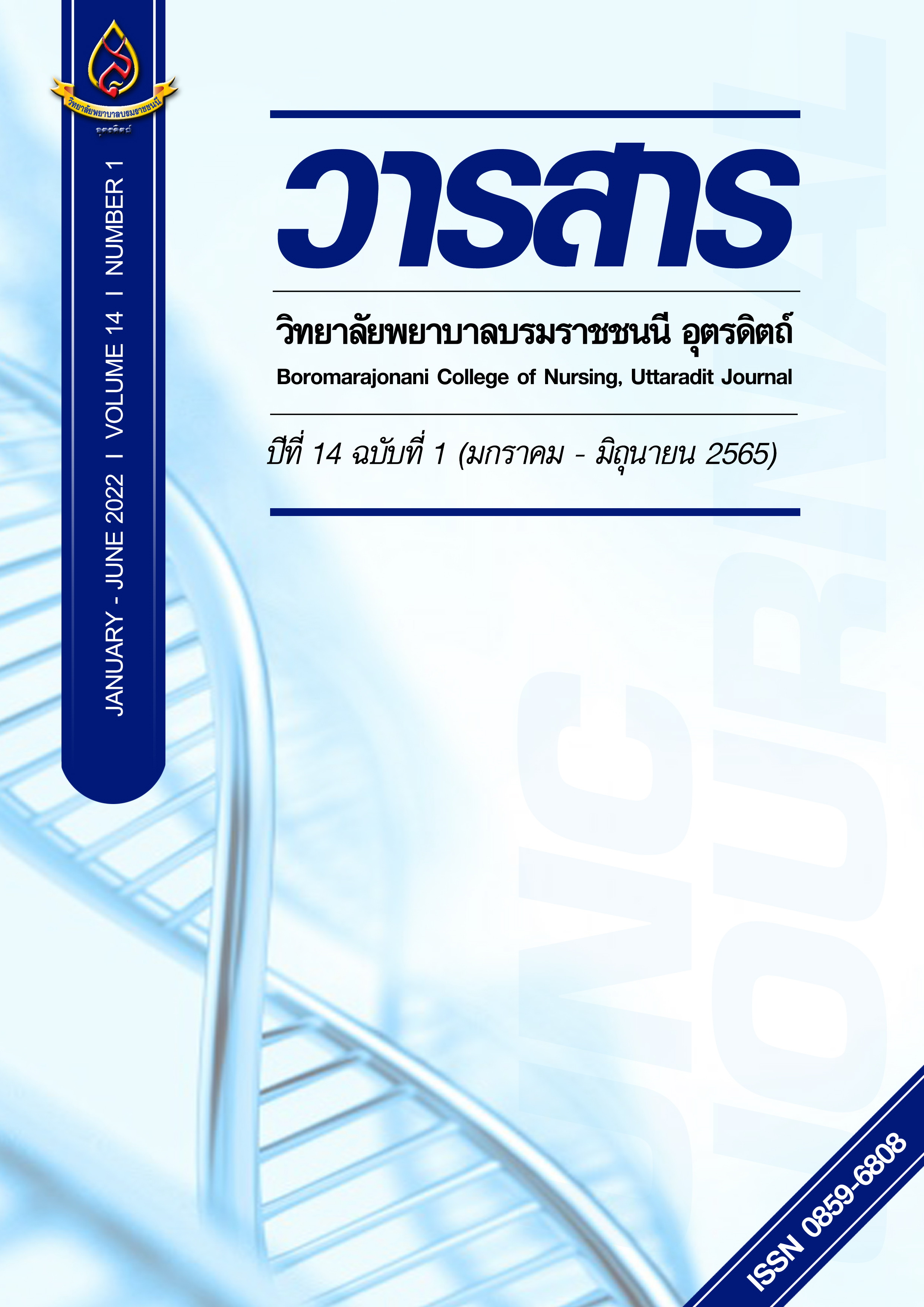The Development of Guideline to Support Self-Care Management among Elderly Patients with Type 2 Diabetes Mellitus in a Community
Main Article Content
Abstract
This research and development study aimed to develop and evaluate the guideline to support self-care management among elderly patients with type 2 diabetes mellitus (T2DM) in a community. The study was divided into three phases. The first phase was the health situation study. Sample were 194 elderly patients with T2DM. Informants were six elderly patients with T2DM. The second phase was the development of guideline to support self-care management. There were eight Informants including health professionals, representative of local government organization, community leaders, and elderly patients with T2DM. The third phase was the guideline implementation and evaluation. Thirty elderly patients with T2DM were selected into the experimental group. There were ten village health volunteers (VHVs) acting as a patient’s supporter in a community. Data were collected by using questionnaires and guidelines for in-depth interview and focus group discussions. Descriptive statistics and the Paired t-test were used to analyze quantitative data. Content analysis was used to interpret qualitative data.
The results in first phase revealed the five dimensions of self-care management behaviors among elderly patients with T2DM. The mental health/stress management dimension was at high level by 63.1%. The exercise/physical activity (61.5%), health-care utilization (71.5%), and health responsibility dimensions (43.6%) were at moderate level. The healthy diet dimension was at low level by 77.7%. In second phase, the guideline to support self-care management consisted of two components: self-care management supported by VHVs and developing self-care management skills. The third phase found that the experimental group's post-test total mean score on self-care management was significantly higher than the pre-test total mean score (p-value < 0.05).
Article Details

This work is licensed under a Creative Commons Attribution-NonCommercial-NoDerivatives 4.0 International License.
Journal of Nursing and Health Science Research attribution-non-commercial 4.0 international (CC BY-NC 4.0). For more detail please visit https://creativecommons.org/licenses/by-nc/4.0/ . The ideas and opinions expressed in the Journal of Nursing and Health Science Research are those of the authors and not necessarily those of the editor .
References
Best, J., W, & Kahn, J., V. (2006). Research in education (A. Burvikovs, E & K. Hopkins, Eds. 10th ed.). Pearson Education Inc.
Bodenheimer, T., Wagner, E.H., & Grumbach, K. (2002). Improving primary care for patient with chronic illness. The Journal of the American Medical Association, 288(14), 1775-1779.
Coleman, K., Austin, B.T., Brach, C., & Wagner, E.H. (2009). Evidence on the chronic care model in the New Millennium. Health Affairs, 28(1), 75-85.
Jiamjarasrangsi, W. (2013). Self-management support interventions for type 2 diabetic patients. Chula Journal of Internal Medicine, 57(3), 279-291. (in Thai).
Knowles, M. S. (1984). Self-directed learning: A neglected species. (3rd ed). Houston: Gulf Publishing Co.
Lorig, K.R., & Holman, H.R. (2003). Self-management education: History, definition, outcome, and mechanism. Annals of Behavioral Medicine, 26(1), 1-7.
Ministry of Public Health. (2020). Health KPI. Retrieved (2021, March 25). from http://healthkpi.moph.go.th/kpi2/kpi/index2/. (in Thai).
Phitsanulok Provincial Public Health Office. (2017). Health data center. Retrieved (2021, May 12). from https://hdcservice.moph.go.th/hdc/main/index.php. (in Thai).
Qi, X., Xu, J., Chen, G., Liu, H., Liu, J., Wang, J., Zhang, X., Hao, Y., Wu, Q., & Jiao, M. (2021). Self-management behavior and fasting plasma glucose control in patients with type 2 diabetes mellitus over 60 years old: multiple effects of social support on quality of life. Health and Quality of Life Outcomes, 19(1).
https://doi.org/10.1186/s12955-021-01881-y
Rosenstock, I. M., Strecher, V. J., & Becker, M. H. (1988). Social Learning Theory and the Health Belief Model. Health Education & Behavior, 15(2), 175–183. https://doi.org/10.1177/109019818801500203
Sittipreechachan, P., Pichayapinyo, P., Lagampan, S., & Chongsuwat, R. (2022). A community health volunteer involvement program for glycated hemoglobin reduction among Thai patients with uncontrolled type 2 diabetes: a mixed-method study. Journal of Primary Care and Community Health, 13.
https://doi.org/10.1177/21501319221077960
Srivanichakorn, S. (2011). How to adjust and reform the system to be relevant to chronic diseases. The Journal of Primary Care and Family Medicine, 2(6), 4-6. (in Thai).
Thai Health Committees. (2011). Community capabilities. Retrieved (2021, March 25). from https://bit.ly/3uSa6pT. (in Thai).
Thananchai, P., & Wangwonsin, A. (2020). Effects of self-management program on health behaviors and blood pressure among prehypertension group, Pak Huaioi health promoting hospital, Phrae province. Boromarajonani College of Nursing, Uttaradit Journal. 12(2), 83-99. (in Thai).
Tsai, A.C., Morton, S.C., Mangione, C.M., & Keeler, E.B. (2005). A Meta-analysis of Interventions to Improve Care for Chronic Illnesses. American Journal of Managed Care, 11(8), 478- 488.
Wagner, E.H., Austin, B.T., Davis, C., Hinmarsh, M., Schaefer, J., & Bonomi, A. (2001). Improving chronic illness care: translating evidence into action, Health Affairs. 20(6), 64-78.
Wangwonsin, A. (2014). Developing an instrument to assess caring in type 2 diabetes mellitus by using chronic care model: a perspective of provider and client. (Dissertation). Naresuan University. (in Thai).
Wangwonsin, A., Jariya, W., & Phetphum C. (2020). Perceived quality of health care by health care system level among type 2 diabetic patients in Northern Thailand. Southeast Asian Journal of Tropical Medicine and Public Health, 51(3), 406-412.
Wangwonsin, A., Kitreerawutiwong, N., Tejativaddhana, P., & Lasuka, D. (2014). A Consensus-based definition on chronic care model of type 2 diabetic patients among Thai experts using nominal group technique. The Public Health Journal of Burapha University, 9(1), 36-50. (in Thai).
Wisutwet, W. (2009). Chronic diseases among elders lighted by the Ministry of Public Health. Retrieved (2021, March 25). from http://www.thaihealth.or.th/Content/12357. (in Thai).
Wongngern, N., & Wangwonsin, A. (2019) Effects of self-Management support program on self- management behavior among uncontrolled type 2 diabetes mellitus patients. EAU Heritage Journal Science and Technology, 13(2), 267-280. (in Thai).
World Health Organization (2016). Diabetes 2016 Thailand country profiles. Retrieved (2021, March 25). from https://www.who.int/publications/m/item/diabetes-tha-country-profile-thailand-2016.
World Health Organization (2017). Fact sheet: diabetes mellitus November 2017. 2017.
Retrieved (2021, March 25). from http://www.who.int/mediacentre/factsheets/fs312/en/


